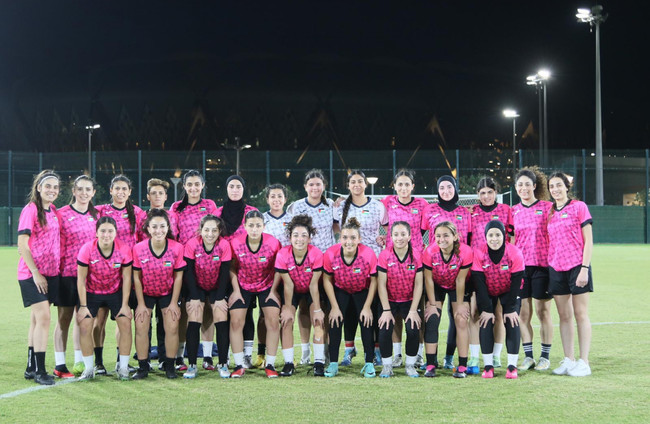THE MAJED ASAD Stadium in Palestine’s West Bank was officially opened by former French international Lilian Thuram in 2011, but a more consequential figure was the friendly security guard who quietly left a gate unlocked.
This allowed boys and girls to sneak onto the field and lose themselves in games of football; rare and blessed moments of free, limitless motion in a land of tightly controlled movement.
Deema Youssef and her friend Mohammad Al-Qatri were among the teenagers who flooded through the unlocked gate.
Deema lived in Sateh Marhaba, a neighbourhood in nearby Al-Bireh, while Mohammad lived in the cramped refugee camp of Al Amari, which lies east of Ramallah city. Mohammad had more than one reason to make the journey to Al-Bireh, as he supported his family with a job at the service desk at the nearby Blatter Football Academy, which was named in 2013 in honour of the now-defenestrated Fifa president.
Both were talented footballers. Deema would play at senior international level for the Palestine women’s team, while Mohammad was on the verge of going professional with a club in the West Bank.
Deema went on to captain Palestine. Mohammad was just 19 years old when he became a victim of the war which continues to this day.
Mohammad was part of a Palestinian demonstration against Israeli soldiers and settlers near Psagot, an Israeli settlement close to the academy. Violent clashes broke out, amid which Mohammad threw stones at an Israeli soldier, who responded by shooting him.
Palestinian medical officials reported that Mohammad was shot dead by Israeli troops. Friends maintain he was injured when he was taken into the Psagot settlement and when his dead body was returned over an hour later, he had been badly beaten.
Mohammad Al-Qatri was killed on 8 August 2014. Nobody has been held accountable for his death. Ahmad Abdelrazek, then the Ambassador of the State of Palestine to Ireland, raised Mohammadd’s story less than a month later in an address to a Joint Oireachtas Committee on Foreign Affairs.
“This incident changed my life,” Deema tells The 42.
“There is a collective feeling of guilt within the Palestinian community. Just being alive and having your family around you is a blessing. We don’t see it as a human right anymore. Instead we think, ‘Thank God we are safe’.
“We shouldn’t be thanking God: it should be a normal thing for human beings. We have this collective feeling of guilt just for surviving.”
Deema made her senior international debut for Palestine in 2011, but retired earlier this year at the age of just 30. The current conflict – the Hamas attacks of 7 October, and the Israeli military campaign in Gaza which has followed – marked a profound shift in her attitude to football: it was the point at which she couldn’t play football anymore; the moment the game started “hurting more than healing”.
“I understand football is a form of resistance and a way to prove we are still there and that is very important, but I just physically couldn’t do it”, she says.
“I felt I was too privileged and it got to the point where I didn’t want the privilege. I know it may sound stupid but I am very honest with myself. I know my body would not respond to playing major games while my mind was so full of those horrendous images of my people being killed.”
She adds: “It is not polite in our culture to whine and complain that ‘I can’t play anymore’, because others have lost their limbs and others have lost their lives and others have been in prison for so long. You think, ‘Okay, keep it to yourself and try to figure it out yourself’.”
Though Deema has retired and domestic football competitions have been suspended since 7 October, the national teams continue to play. The men’s team competed at the recent Asia Cup, beaten by hosts Qatar in the first knockout round, while the women’s team played at the West Asian Championships in Saudi Arabia in February, again beaten in the first knock-out round.
“We think sports is one way to fight for our country, we want to show people we are Palestinians, we are representing Palestine and Palestine is still here”, says Bisan Abuaita, a current squad member.
Both national teams have also played friendly games where possible, and the women’s team will come to Dublin to play Bohemians at Dalymount Park on 15 May.
And though Deema has retired from playing, she will be part of the travelling party in her new role as managing-director, in which she oversees logistics; a difficult job in the West Bank.
Israel has occupied the West Bank since 1967, with its control over Palestinian movement tightening over time. Residents of Gaza, east Jerusalem, and the West Bank are all given separate ID cards, and can only travel between these areas if they are given a special permit by the Israeli government, which are extremely difficult to obtain.
Another means of limitation are the many checkpoints operated by Israeli soldiers. These regularly close at a moment’s notice, often under the blanket justification of security concerns. Added to that are the physical hurdles: in 2018 the United Nations reported there were more than 700 obstacles restricting Palestinian movement by car, which included gates, earthmounds, and trenches.
The result is that a Palestinian living in the West Bank can give no firm commitment to being anywhere at any time of any day, and so it is extremely difficult to plan anything like the preparation befitting an international football team. Bisan recalls a national team training session to which only seven players showed up, owing to the abrupt closure of a checkpoint nearby. The goalkeeper coach stood in goal to allow them to get some work done. Other sessions are frequently cancelled at short notice, with players told instead to train locally or at home.
“Life in general in Palestine teaches you that you have to be patient”, says Mira Natour, another current Palestine international. “We are resilient individuals who are full of patience. We are full of patience to play, full of patience to represent Palestine.”
The team can only be guaranteed training time together when they are abroad, but there is no airport in Palestine from which they can fly. Instead they fly from Jordan, and must navigate three separate checkpoints to reach the airport. The initial Palestinian crossing is usually straightforward, and the national team always links up together to cross the second Israeli border together.
“That is the hardest one as they do security checks on everybody, and you can’t guess with these people,” says Deema. “They can just decide to ban someone from leaving, and for no reason whatsoever. It is always a risk. It’s very physically tiring for players, this has affected us. Once we were stuck for 10 hours at the Israeli checkpoint.”
Then there is a border crossing into Jordan before anyone gets the luxury of queueing at the airport. It’s not a case that a football team finds it more difficult to cross the Israeli checkpoint, however.
“For them, it’s a Palestinian, it does not matter,” says Deema. “If you are a doctor or a teacher or a football player, it does not matter. If you’re a child or elderly, it does not matter. They do not care. For them, you are a Palestinian, you hold this ID: I am going to make your life as miserable as possible.”
The national team’s home ground – and the headquarters of the Palestine FA – is the Faisal Al-Husseini international stadium, where the women’s team haven’t played since 2021 and the men’s team since 2019. The stadium is located in Al-Ram, a town in the suburbs of Jerusalem that has been occupied by Israel since 1967 and is divided by a profound monument: a separation barrier – referred to in Arabic as the “apartheid wall” – built in 2002 that separated some Palestinians’ homes from the land they farmed.
The stadium was last year the site of an Israeli aggression, when police and soldiers threw tear gas onto the pitch and into the stands during the men’s domestic cup final. The Asia Football Confederation condemned the attack as “unprovoked” and “horrific”. Israel claimed it was unintentional, saying tear gas deployed to disperse protests near the stadium was carried by the wind.
“It was terrifying,” recalls Deema, who was among the crowd.
More than 34,500 people in Gaza have been killed in Israel’s military campaign against Hamas, according to the latest death toll from the Palestinian health ministry. Violence in the West Bank has also increased: from 7 October to 16 February this year, humanitarian portal ReliefWeb reports that 389 Palestinians – 100 of them children – were killed across the West Bank, east Jerusalem, and Israel, with another 4,503 injured.
“There is so little we can do,” says Deema. “Demonstrations in Palestine are controlled, if you go to a protest you are likely to be arrested by Israeli soldiers. You could be shot at any moment in time.
“The number of attacks by settlers on the people of the West Bank is going through the roof. That makes you feel unsafe and that you can’t do anything. This feeling of helplessness is just killing me, to be honest.
“It has been like this for a really long time. I can’t say it is getting better, you just learn to live with the status quo. Wake up, do your job, try to see your family, make sure everything is fine, and focus on what’s positive in your life. You can’t do much more than that.”
The scale of the violence in Gaza is what has changed since 7 October. When the women’s national team squad is together, Bisan admits efforts to avoid talking about the war in Gaza are usually forlorn. Nobody escapes its brutality, horror, hopelessness and sheer, awful pervasiveness.
Deema and Bisan both tell me that 119 footballers have been killed in Gaza. This includes Hani Al-Masdar, who is regarded as one of Palestine’s greatest-ever players. Saeb Jendeya, the first-ever captain of the Palestinian men’s team, is currently homeless and living in a tent following the destruction of his home.
“I am from Palestine and I would never want to change that for the world,” says Bisan. “At the moment, I feel we are playing for everyone who has been killed, everyone who has been martyred. All the athletes, and for everyone. There is so much on our shoulders when we go on the pitch to play.”
“I play football to show the world that Palestinians still exist,” adds Mira. “They are trying to remove us from the map but we want to show the world we still exist, we still have the rights to play and the rights to express our feelings; to show we are human beings and we have the same rights you also have. Everytime I play for the national team something inside tells me, ‘You are here for a purpose.’”
Bisan and Mira will play at Dalymount Park, while Deema will travel with the squad in her new role.
“It is an honour to be invited to Ireland,” says Deema. “I believe that the Palestinian and Irish experience have similarities.
“We see the similarities and we appreciate the solidarity movement from the people of Ireland. It is close to our hearts and something we will cherish forever. Long live Ireland.”
Tickets for Bohemains vs Palestine at Dalymount Park on Wednesday, 15 May, are on sale now. All proceeds go to Sport For Life Palestine, Medical Aid For Palestinians, & Aclaí Palestine.





